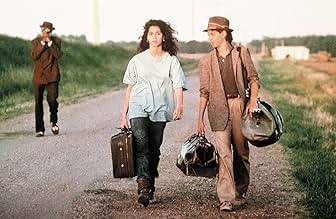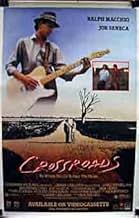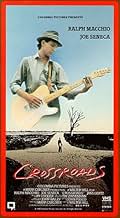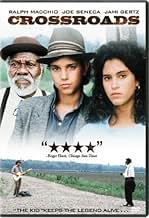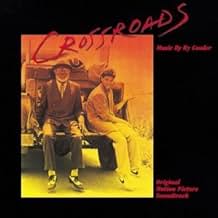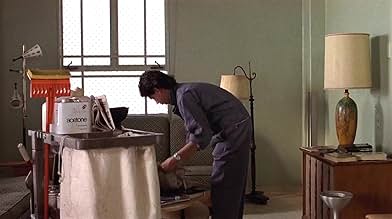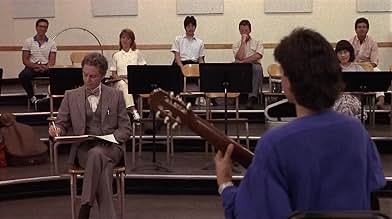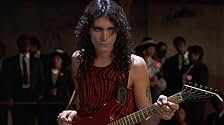Ralph Macchio ist ein Blitzjunge.Ein Kind, das eine Slide-Gitarre zum Singen bringen kann. Blind Dog ist ein alter Profi, der es weiß. Zusammen gehen sie zu einem Ort, an dem Geschäfte gemac... Alles lesenRalph Macchio ist ein Blitzjunge.Ein Kind, das eine Slide-Gitarre zum Singen bringen kann. Blind Dog ist ein alter Profi, der es weiß. Zusammen gehen sie zu einem Ort, an dem Geschäfte gemacht werden. Und Legenden werden geboren.Ralph Macchio ist ein Blitzjunge.Ein Kind, das eine Slide-Gitarre zum Singen bringen kann. Blind Dog ist ein alter Profi, der es weiß. Zusammen gehen sie zu einem Ort, an dem Geschäfte gemacht werden. Und Legenden werden geboren.
- Auszeichnungen
- 1 wins total
- John McGraw
- (as Tex Donaldson)
Empfohlene Bewertungen
This is Hill's best film. Like "Crossroads", many of his films have interracial lead characters and Hill always gives a unique, honest slant on racism and social differences among these types of relationships (or if its an amicable relationship - the lack thereof). The script may be a little thin for some (Jami Gertz's character is a little weak, and she resorts to overacting too often), but Joe Seneca carries the movie with weathered grace as Eugene's fatigued hero who hopes of correcting his shady past in order to save his future. Ralph Macchio expertly plays a naive, impressionable teenager whose skill and love as a musician ultimately generates his confidence and even bull-headedness: he's a blues guitarist who knows what to play but not how to play it. And who can forget the "cutting heads" showdown at the end of the film? Eugene fights tool-and-nail against master guitarist Steve Vai as Jack Butler. The duel is ABSOLUTELY incredible, and no matter how many times I've seen it, I never get bored.
The tone and pacing of this film is tempered, quiet and casual, with none of its plot twists dipped in melodrama for maximum effect. Willie Brown's description of the South is never fully realized on screen, even it's bleakness is absent of any vivid cinematography, but this is overall a great film. As Willie tells Eugene late in the film, "Blues ain't nothin' but a good man feelin' bad." I love this movie!
Ralph Macchio plays the role of a young teenager, finding the blues and wanting to be a blues player instead of classical guitarist that he is training for. Joe Seneca plays the role of Willie Brown and he lives that role as though he really is Willie Brown. The music played in the scene at the end where Eugene gets Scratch to tear up the contract for Willie's soul is magic and brings tears to my eyes every time I see it. Maybe there is a place for both blues and classical.
So the story plays on the old "deal with the devil" trope that we have seen since Faust. The interesting detail is how they incorporated a new wrinkle to the story. While some might say there are too many holes in the story, I don't think it detracts too much from the overall story (like what is the deal with Eugene's parents).
All I can say is stay for the music, enjoy the fun and drink some whiskey.
It has everything that I love in a movie: good story, great characters well acted, fine comedy and powerful touching drama. Ralph Macchio is a brilliant young guitar student, Eugene Martone, at Julliard (or some other equally good music school) who does not want to play Mozart. He wants to play guitar like his idol, a long dead blues guitar legend. In search of his dreams, he breaks an elderly black blues player out of a prison nursing home.
The two of them go on an odyssey to the Mississippi Delta in quest of memories and dreams. As in any odyssey, they meet a variety of fascinating and/or dangerous characters along the way. Eugene must also overcome the obstacles and tests that all those who quest must face - until it is time to face the ultimate test against the greatest blues guitarist in the Delta.
I enjoy music, but my knowledge is superficial. I probably wouldn't know a good guitar riff from a raft, but even I could recognize awesome guitar work in the final sequence of Crossroads.
So, if you like good movies and good acting and great guitar music, please check out Crossroads. If enough of us spread the word, it may no longer be a forgotten classic.
Eugene Martone, considered a prodigy on the classical guitar, is a young Long Island man attending the prestigious Julliard Music School. Problem? He prefers the blues over classical. And he's on a quest. He uncovers evidence that blues guitar legend, Robert Johnson, composed 30 songs. Since only 29 were ever recorded, he becomes obsessed at finding the 'lost' song number 30 (and being the first person to record it). And, after some sleuthing, he finds an old photograph and a news clipping -- pointing him toward the only living person who would know that song and who, fortunately, lives nearby. His name is Willie Brown (aka Blind Dog Fulton, aka Smokehouse Brown), a friend of Robert Johnson who traveled and performed with him (harmonica/vocals). Brown lives in a penal facility for old people (a criminal's nursing home). At first, Brown denies his true identity. But confronted with a photo of himself next to Robert Johnson, Brown finally admits the truth. And, he agrees to teach Martone the lost song -- but ONLY if Martone breaks him out of the facility and takes him back to Mississippi.
The catch? Martone knows that lore surrounding Robert Johnson says he sold his soul to the Devil. What he doesn't know is that it's fact, not lore ... and that Willie Brown did the same thing. And Martone doesn't know that Brown's reason for going back to Mississippi is to return to the 'crossroads' where he and Johnson sold their souls in hopes of getting the Devil to release him from his contract. This culminates in an eerie finale where Martone gambles his soul in a blues duel with the Devil's own guitarist, Jack Butler ... to save Brown from eternal damnation.
Director Walter Hill is masterful, combining music, drama, alternate history, fantasy, and horror into a single plot. Kudos must also be given to screenwriter John Fusco for giving Hill a masterful script to work from. But contrary to most people, my favorite scene isn't the blues duel. It's the scene where Martone wakes up to find out a girl he met in his travels with Brown (and had a romantic interest in) has unexpectedly left them to go her own way. And immediately after that, Brown admits he lied... that there never was a song number 30. At that moment, Martone, who'd been merely a good blues 'player' up to that point picks up his guitar and begins to play a sad blues song ... one certainly coming from his soul, not from his memory of what others have played. It is that momentary 'graduation' scene (the transition between blues 'player' and blues 'man') that sets the stage for the duel ... with film watchers knowing Martone is as ready for it as he can be.
Wusstest du schon
- Wissenswertes"Eugene's Trick Bag", the updated classical piece at the film's climax, is largely based on Niccolò Paganini's "Caprice #5". According to myth, Paganini sold his soul to the devil for his musical skills. Steve Vai replicates Paganini's legendary rolling eyes, long unkempt hair and gaunt look.
- PatzerAt the time the movie was filmed, Julliard did not offer classes in classical guitar.
- Zitate
Willie Brown: The blues ain't nothin' but a good man feelin' bad, thinkin' 'bout the woman he once was with.
- VerbindungenFeatured in At the Movies: Salvador/Smooth Talk/Crossroads/Turtle Diary (1986)
Top-Auswahl
Details
Box Office
- Bruttoertrag in den USA und Kanada
- 5.839.031 $
- Eröffnungswochenende in den USA und in Kanada
- 2.071.680 $
- 16. März 1986
- Weltweiter Bruttoertrag
- 5.839.031 $
- Laufzeit1 Stunde 39 Minuten
- Farbe
- Sound-Mix
- Seitenverhältnis
- 1.85 : 1
Zu dieser Seite beitragen





